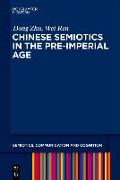Chinese Semiotics in the Pre-Imperial Age
BücherAngebote / Angebote:
The book is a systematic inquiry into how Chinese philosophers understood signs during the Pre-Imperial Age, which is better known among the Chinese as the Pre-Qin period. Described by Karl Jaspers as the Axial Age, it is the most important period in the development of Chinese philosophy. It is in this period that Confucius, Mencius, Laozi, Zhuangzi , as well as other distinguished scholars, emerged and made their voices heard. This boom in Chinese philosophy is comparable to that in ancient Greece at the time of Plato and Aristotle. Among the Hundred Schools, Mohism and the School of Names helped to lay the foundation for the study of semiotics in ancient China. Their work has long been a rich source of thought for later scholars. Therefore, it is no exaggeration to say that to master the semiotic thought of Pre-Imperial China is to understand the roots of traditional Chinese semiotics. Methodologically, the present book tries to contextualise the historical approaches to semiotics and to understand them as part of the effort to establish order during periods of disturbance. In this way, semiotic thought can be understood in its historical and social context. This historical analysis and cultural interpretation will demonstrate that the philosophers of the Pre-Imperial Age attached great importance to signs because they believed that by reconstructing the order of signs they could restore order to society. The present book is the only one to pursue a systematic inquiry into, and analysis of, the development of semiotic thought in Pre-Imperial China and is viewed as an important step forward for the reconstruction of a Chinese traditional semiotics.
Noch nicht erschienen. Termin unbekannt
